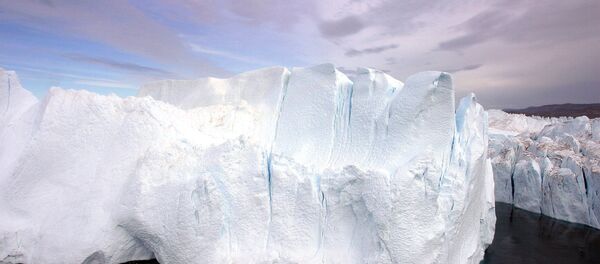About 56 million years ago, the Earth began to heat up rapidly, an event called the Paleocene–Eocene Thermal Maximum (PETM). Now, a group of researchers say, they have evidence that an extraterrestrial body crashed into the planet at almost the same time – and may have been its cause.
Researchers affiliated with Rensselaer Polytechnic Institute, Rutgers University and Columbia University have found tiny round bits of dark glass called microtektites that are strong indicators of a comet or asteroid collision. The black dots are thought to form when the space rock vaporizes the ground where it hit, sending tiny bits of molten rock into the air, where they cool and solidify into the glass.
The researchers have found these microtektites of the same age in sediment in several parts of New Jersey and 700 miles away in the deep seabed off Bermuda.
"This tells us that there was an extraterrestrial impact at the time this sediment was deposited – a space rock hit the planet,” said Assistant Professor of Earth and Environmental Science at Rensselaer Morgan Schaller, one of the authors of the paper, in a statement on the Rensselaer website. "The coincidence of an impact with a major climate change is nothing short of remarkable."
In the PETM, carbon suddenly (in geological terms) filled the atmosphere. Temperatures rose by 5 to 8 degrees Celsius and seas became more acidic. The changing global environment drove many animals toward the poles and cooler temperatures, and it was after this period that many modern mammal families emerged.
No one is sure why it happened, or exactly how fast the planet warmed up and cooled off, but scientists are very interested in learning more about the PETM, which lasted about 150,000 years, as there are clear parallels with the climate changes occurring today.
"It's got to be more than coincidental that there's an impact right at the same time," Schaller said about their findings, according to Phys.org. "If the impact was related, it suggests the carbon release was fast."
The PETM is believed to have been caused by a sudden release of carbon into Earth’s atmosphere, but where the carbon came from is debated. It has been suggested that a series of volcanic eruptions released carbon into the air. A Rice University team suggested in 2011 that ocean methane stores were disturbed and released into the atmosphere, causing the warming – but said at the time that "there's no evidence of there having been an impact. So what happened to release the methane 56 million years ago?"
The study authors hit upon this discovery by accident. Schaller was looking for fossilized remains of the tiny shelled organism Foraminifera when he found a microtektite in the sediment he was examining. Researchers often look for fossils in PETM-era sediments, the statement noted, but microtektites had not been previously been found – possibly, as Schaller and his team theorize, because microtektites are usually dark and don’t stand out against the black sorting trays researchers use to search for light-colored fossils.
"We were having lousy luck looking for [Foraminifera], and I was frustrated," Schaller said in the Rensselaer statement. "I went to the lab and dumped a sample on the sorting tray without sieving it, and there it was. It was a stunning moment. I knew what I was looking at was not normal."
When the researchers switched to a white sorting tray, they began to find more microtektites, as many as three per gram of sediment examined. Some microtektites they found contained "shocked quartz," which is considered definitive evidence of an impact origin.
"This could very well be the ground zero" of the warming period, said Dennis Kent, co-author of the study and a researcher at Columbia University's Lamont-Doherty Earth Observatory and Rutgers University, according to Phys.org. "It got warm in a hurry. This suggests where it came from."
Kent has argued since 2003 that a comet collision caused the PETM.





